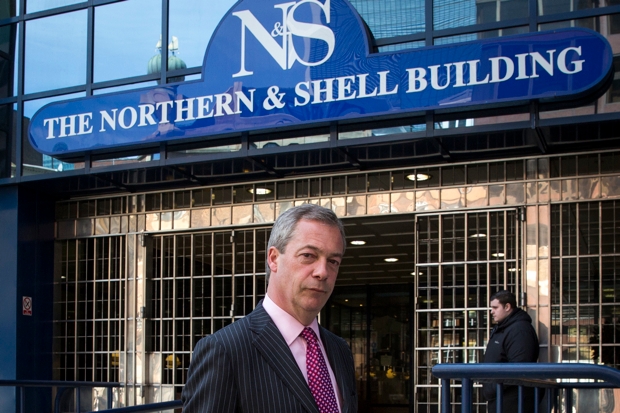If I had a spare £1 million swashing about in my bank account or down the back of the sofa, I am pretty sure I could come up with, give or take, a million different and better ways of spending it other than donating it to a political party. A children’s cancer charity, for instance. Or, if I’m feeling a little less altruistic, a nice yacht maybe.
Clearly, Richard Desmond, the owner of Express newspapers, couldn’t think of any better way to spend his hard-earned dosh so he’s decided to give his spare £1.3million to Ukip to help fund their general election campaign. This comes on top of an earlier £300,000 donation. Cue gasps of outrage and raised eyebrows at why a newspaper and magazine tycoon should want to hand over his cash to, of all people, Nigel Farage.
Desmond’s donation was wrong. But not because it was from him or to this particular party, but because ALL donations of this size to ANY political party are wrong.
Let me give you 45 million reasons why.
There are 45 million people registered to vote in this general election and each of those votes is worth the same as any other vote. One person, one vote. Well, that’s how it’s supposed to work anyway.
Yes, sure, if you happen, as I do, to live in a marginal constituency, where your decide to place your cross on the ballot paper may end up having a bigger effect on the day in terms of who is elected, but nevertheless your one vote still counts only as much as any other vote cast on the day.
Big political donations irrevocably change that principle. They, with the swish of an electronic bank transfer, make one man’s vote count for a heck of lot more than another’s.
Of course that’s not how the party leaders or treasurers see it, or indeed how the donors will want it to be seen, but that’s what large political donations do – and that’s exactly why millionaires show such largesse.
The rich and the powerful have long been generous benefactors to political parties. Indeed, Britain has a centuries-old dishonourable tradition of allowing our democracy to be distorted and bought by the highest bidder.
There is no doubt in my mind that many party donors – to all parties – can convince themselves that they are giving money to a political cause out of the altruistic belief that they are helping their country get the best government. But if they really want to help Britain, they should be fighting to defend this country’s democratic values and not undermining them by buying their way into the corridors of power.
When you give a huge sum to a political party, you automatically make your vote count for more. Have you ever donated a huge sum to a political party? Have you ever been invited to an intimate dinner with the leader of that political party to discuss your views? I’m going to go out on a limb here and suggest that your reply to the latter question is likely to be the same as your response to the former.
If you donate tens of thousands of pounds to a political party – let alone £1million or more – you will not find it difficult to get ‘face time’ with party leaders to discuss and promote your views on what the next government should do. And it is an astounding coincidence how many people who make huge party political donations end up getting knighthoods or even peerages, where they then become lawmakers themselves.
Every party does it – yes, including the so-called ‘nice’ ones. It’s not usually blatant – ‘I’ll give you a million quid and in return, I want this or that policy enacted or stopped’ – but sometimes it is. Yes, I’m looking at you Bernie Ecclestone and Tony Blair. But usually it is much more subtle, with party leaders and strategists perhaps looking more favourably on policies that just happen, by chance, to favour the business interests of their major donors. It’s just human nature.
We got rid of rotten boroughs in 1832, now it’s time to end the system that allows a few very wealthy voters to have a bigger say in who governs our country than you or me. The first act of the next government should be to impose a legal limit of, say, £5,000 on donations from any individual, company or organisation (and, yes, I do include trades unions).
But where will all the money come from for party election campaigning? Well, there probably won’t be as much cash sloshing around, but that’s hardly a bad thing.
I have a funny feeling that most British voters have the wit to make up their minds who to vote for without expensive billboard campaigns or flashy party political broadcasts. And if we taxpayers have to pay a little extra to fund political parties – although I know this wouldn’t be popular – we would be doing ourselves a good service by keeping money out of our political system.
When I go to the polling station on 7 May, I want to know that my vote counts. It may not, on its own, decide the outcome of the election, but at the very least my vote should have equal weight with everyone else’s to make that decision.
When multi-millionaires hand over large wads of cash to political parties – of whatever political hue – they make their votes count more. That is undemocratic and it should be against the law.
And if Desmond, or any other millionaire party donor out there, needs some ideas for alternative ways to spend his cash, I am sure there are plenty of children’s cancer charities that can help him out.






Comments